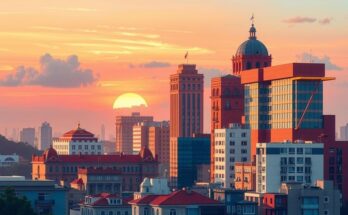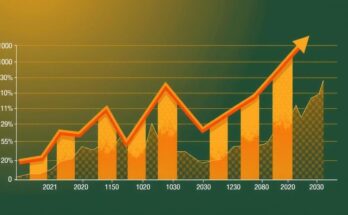A World Bank report reveals that 92% of South Sudan’s population lived in extreme poverty in 2024, primarily due to poor governance and economic mismanagement. Key challenges include hyperinflation and food insecurity affecting nearly 80% of the public, necessitating urgent policy interventions for economic stability and recovery.
A recent World Bank report revealed that approximately 92% of South Sudan’s population, totaling around 11 million individuals, lived below the extreme poverty line in 2024. This extreme poverty is defined as living on less than $2.15 daily. The report, launched in Juba as part of the seventh edition of the South Sudan Economic Monitor (SSEM), identified weak governance and mismanagement of oil revenues as major factors contributing to the increase in poverty rates.
Entitled “A Pathway to Overcome the Crisis,” the report highlighted significant challenges such as hyperinflation and widespread food insecurity, which have impacted nearly 80% of the South Sudanese population. Charles Undeland, the World Bank Group Country Manager, noted a significant decline in the economy, indicating a rough GDP contraction of 30% for Fiscal Year 2025 and inflation rates soaring to 139% in August 2024, reducing the purchasing power of individuals in the nation.
Dr. Marial Dongrin Ater, South Sudan’s Minister of Finance and Planning, emphasized that the findings would aid in guiding both current and future policy attempts. He affirmed the government’s dedication to stabilizing the economy through prudent fiscal and monetary policies, which have shown promising results in exchange rate stability and fiscal transparency.
Professor Robert Mayom Deng, Vice Chancellor of the University of Juba, warned that inflation continues to diminish household purchasing power. He remarked on the importance of the report in addressing macroeconomic policies necessary for overcoming crises and promoting inclusive growth, especially in context to poverty and rising living costs.
In conclusion, the World Bank’s report indicates a critical economic crisis in South Sudan, with a staggering 92% of the population living in extreme poverty. Factors such as poor governance, inflation, and food insecurity are exacerbating the situation. However, government officials express hope, citing efforts to restore economic stability through effective fiscal measures. The insights provided in this report are essential for guiding future policies aimed at recovery and poverty alleviation.
Original Source: www.radiotamazuj.org




